Importance of Assessment in the Five Domains
- Helps to discover problems in development.
- Analyzes the state of every child.
- Determines a set of tools to use.
- Improves outcomes of the teaching process.
- Promotes better performance in educators.
- Reduces the risk of failures.
The modern educator faces multiple challenges that come from the complexity of the environment and increased demands for children and their development. For this reason, the assessment in the five domains becomes one of the central tools that should be used by teachers while working with pupils (Bartolotta & Shulman, 2010). There are numerous opportunities provided by this method. The most important one is the ability to determine problems in children`s development and eliminate them (Department of Education, 2010). Additionally, by analyzing every student`s progress, an educator becomes able to improve outcomes by selecting the most appropriate tool and applying it to improve his/her performance and reduce the risk of inappropriate results.
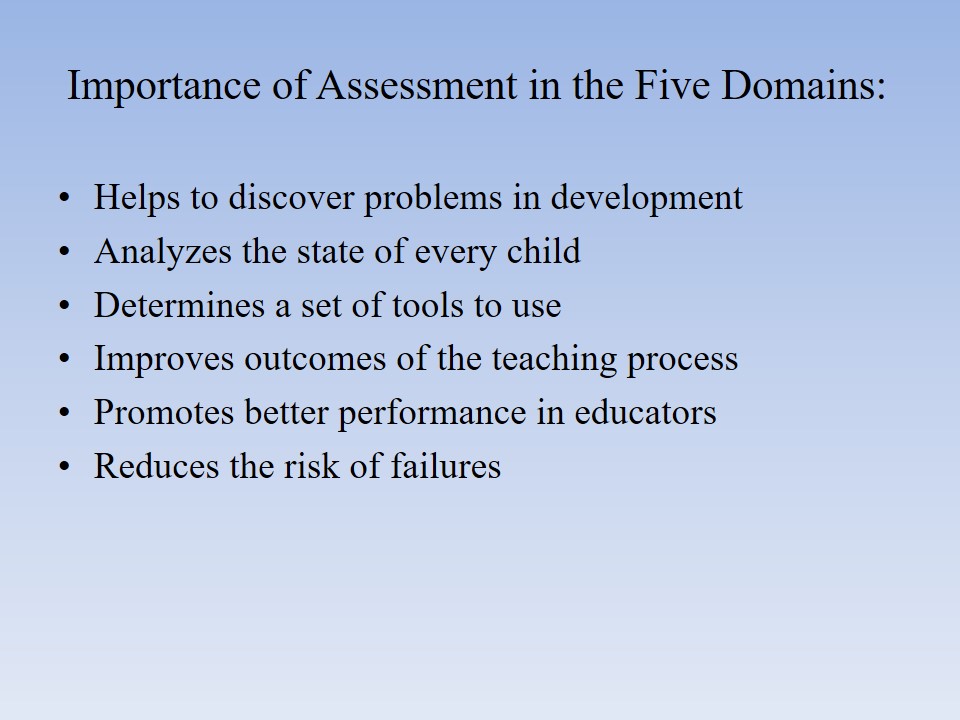
Five Domains
- Cognitive (Reading and Math concepts);
- Social/Emotional;
- Language/Communication;
- Motor;
- Self-Help/Adaptive.
The given five domains play the crucial role in the development of a child and his/her formation. They encompass all central functions starting from reading and ending with the ability to communicate with other pupils. For this reason, their correct assessment is the key to the final success and comprehensive development of students. Educators should possess extensive knowledge of all five domains, their significance, how they impact the evolution of a child, and how problems discovered in one of them can be solved by using specific tools (Bartolotta & Shulman, 2010). This information is essential for early childhood learners as it contributes to the better understanding of central goals and facilitates improved cooperation.
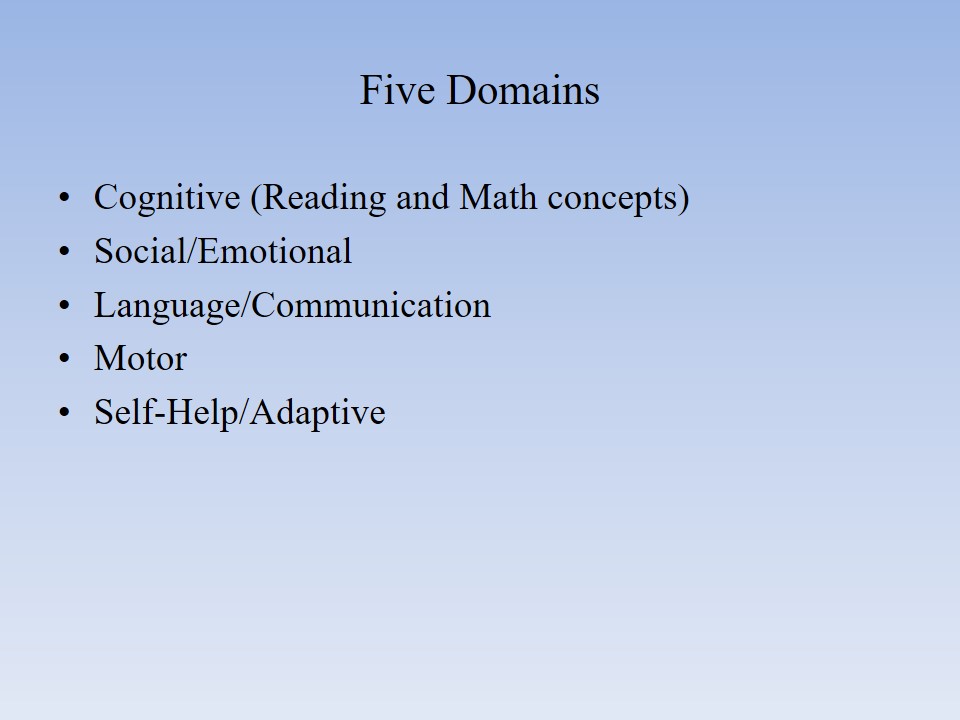
Cognitive Domain
- Assessments are focused on the evaluation of the intellectual functioning.
- Children should have appropriate responses.
- Developed adaptation process.
- Appropriate levels of assimilation.
- Accommodation should also be assessed.
- Progress in the evolution of perception, memory, imagination, reason, and judgment.
The importance of the cognitive domain`s assessment is evidenced by the fact that cognition involves multiple mental activities that impact the further development of a child and his/her becoming an active learner. At the same time, problems in the given domain might indicate delays in the development that should be eliminated to provide a child with an opportunity to become a successful pupil (Department of Education, 2010). That is why the cognitive assessment is focused on the evaluation of the intellectual functioning of a child including appropriate responses to stressors, high levels of assimilation (ability to cognize new stimuli), accommodation (development of new responses), and significant progress in perception, memory, imagination, reason, and judgment`s development (Bartolotta & Shulman, 2010). These elements are fundamental for children`s academic successes, which proves the importance of their assessment.
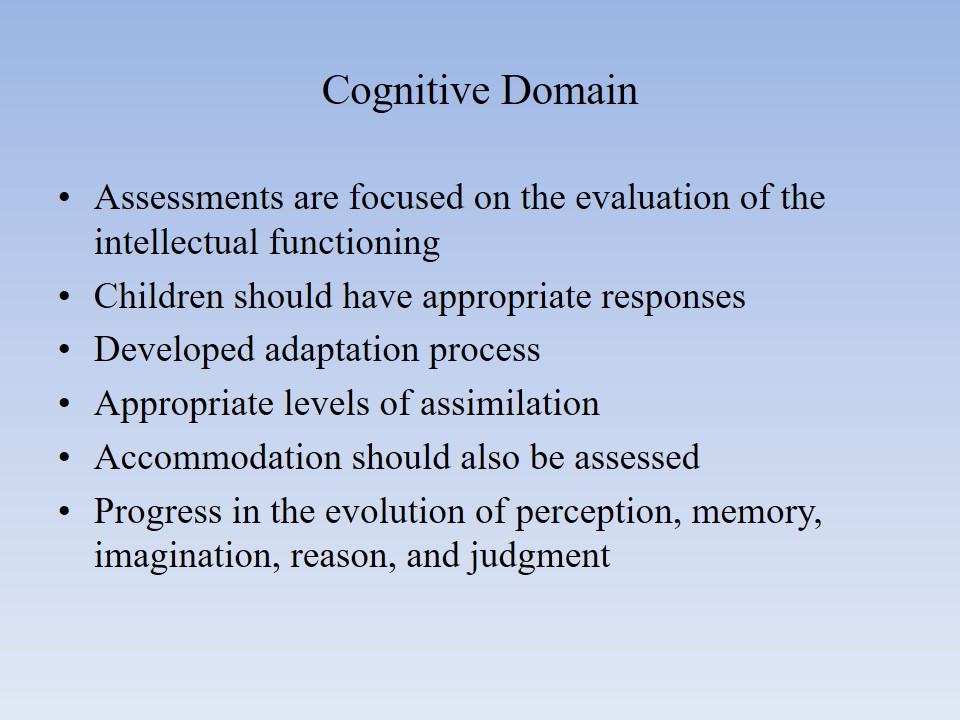
Social/Emotional Domain
- Evaluation of social-emotional functioning.
- Significance of adaptive behavior.
- Determination of autism symptoms.
- Attention and activity levels.
- Cooperation with other students.
- Social success.
The in-depth investigation of the social domain is another critical aspect of educators` functioning. In early childhood, children should demonstrate specific behavioral intentions aimed at the development of communicational patterns and cooperation with other children, which is critical for the socialization and future ability to integrate with the society (Bartolotta & Shulman, 2010). At the same time, the evaluation of this domain might help to determine symptoms of autism or other behavioral problems such as low attention or activity levels, inability to adapt to new groups or problematic cooperation (Department of Education, 2010). It is a critical part of the teaching process as the discovery of these problems in their early stages will help to select appropriate tools to solve the problem.
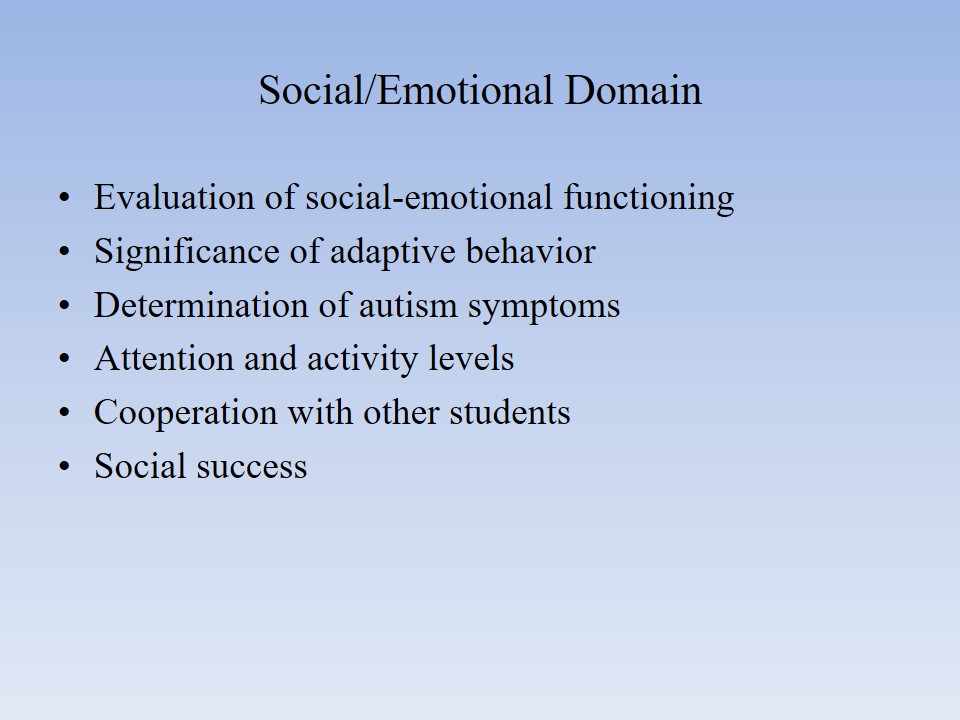
Language/Communication Domain
- Evaluation of expressive and receptive communication.
- Appropriate levels of articulation.
- Gradually enlarging vocabulary.
- Improved auditory processing skills.
- Basic knowledge of semantics.
- Ability to express thoughts.
The importance of the language/communication domain comes from the necessity to develop the organs of speech and acquire the ability to express thoughts in understandable manners. For this reason, evaluation of expressive and receptive communication along with the determination of current articulation levels plays a significant role in the work of educators teaching young children (Department of Education, 2010). Discovery of any problems in one of the aspects listed above might indicate the existence of particular problems with cognitive and linguistic development. It might have a pernicious impact on the development of children and their socialization (Bartolotta & Shulman, 2010). For this reason, assessing the given domain, the educator ensures that appropriate levels of communicative skills are acquired.
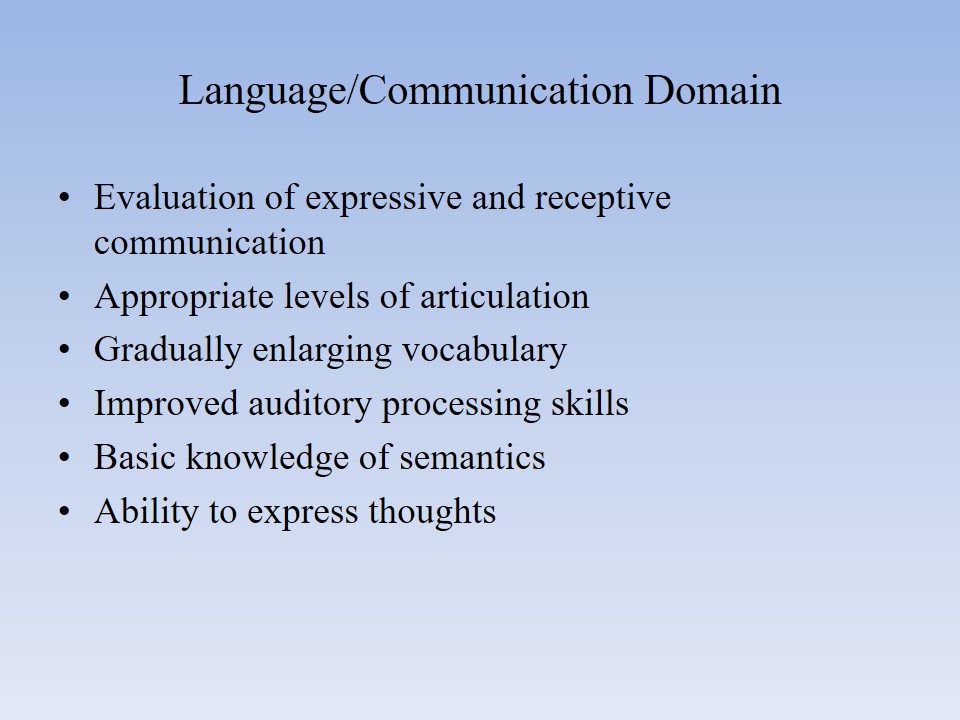
Motor Domain
- Assessment is focused on fine motor skills.
- Gross motor skills are also evaluated.
- The overall levels of mobility are analyzed.
- Visual motor skills should be assessed.
- The basic sensory functions and their appropriate utilization are checked.
The motor domain is another sphere essential for the development of children in the early childhood stage. At this period, they should acquire improved fine and gross motor skills to work with multiple objects and cognize the world that surrounds them using diverse tools (Bartolotta & Shulman, 2010). The task of the early childhood educator is to critically evaluate the level of these skills` development to ensure that a child does not have problematic issues in the given sphere. The importance of the process is evidenced by the role of motor skills play in future life and the existence of specific diseases characterized by the problematic development of the motor function (Department of Education, 2010). For this reason, the timely determination of the state of the motor domain might help to provide the needed assistance to children or approve specific interventions.
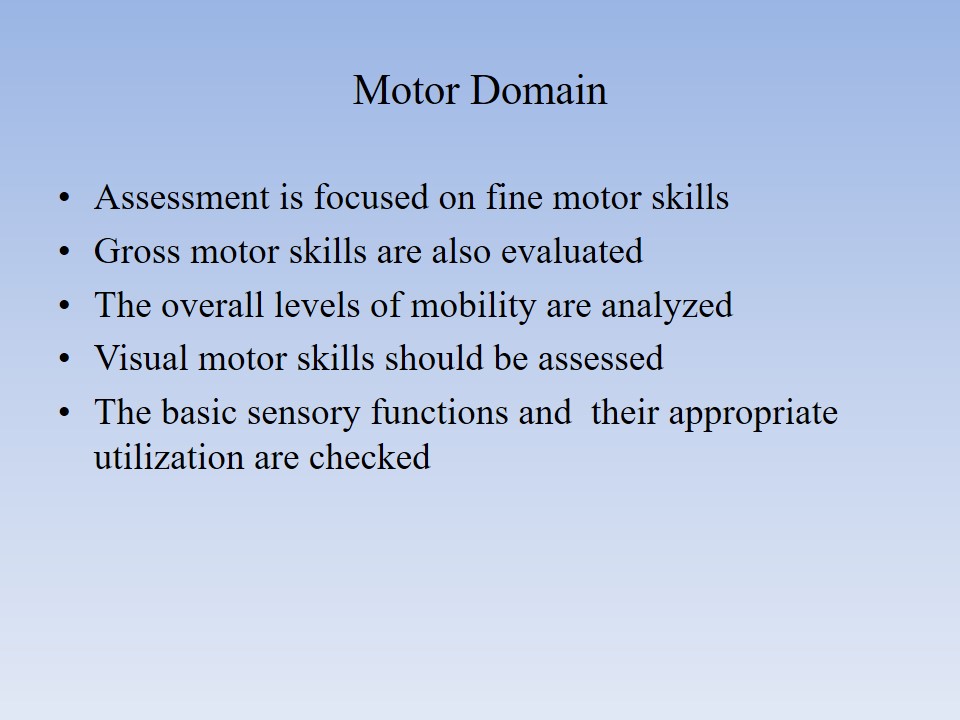
Self-Help/Adaptive Domain
- Evaluation of the ability to adapt to new conditions.
- Assessment of the levels of independence.
- Learning to dress and feed themselves.
- Use of the toilet and bathroom.
- Less dependant on parents.
Finally, self-help/adaptive domain encompasses the development of appropriate responses to stressors that come from the outside world and the increasing levels of independence in children. They should be able to use the toilet, dress and feed themselves, brush their teeth, use the bathroom (Bartolotta & Shulman, 2010). The presence of these skills indicates the normal development of a child. For this reason, the educator should assess the state of the given domain to determine problems at their early stages because their further evolution will result in the problematic socialization and integration with the society (Department of Education, 2010). Additionally, the inability to acquire particular self-help skills might indicate diverse mental disorders. For this reason, it is critical to analyze the given sphere to eliminate any problematic issue.
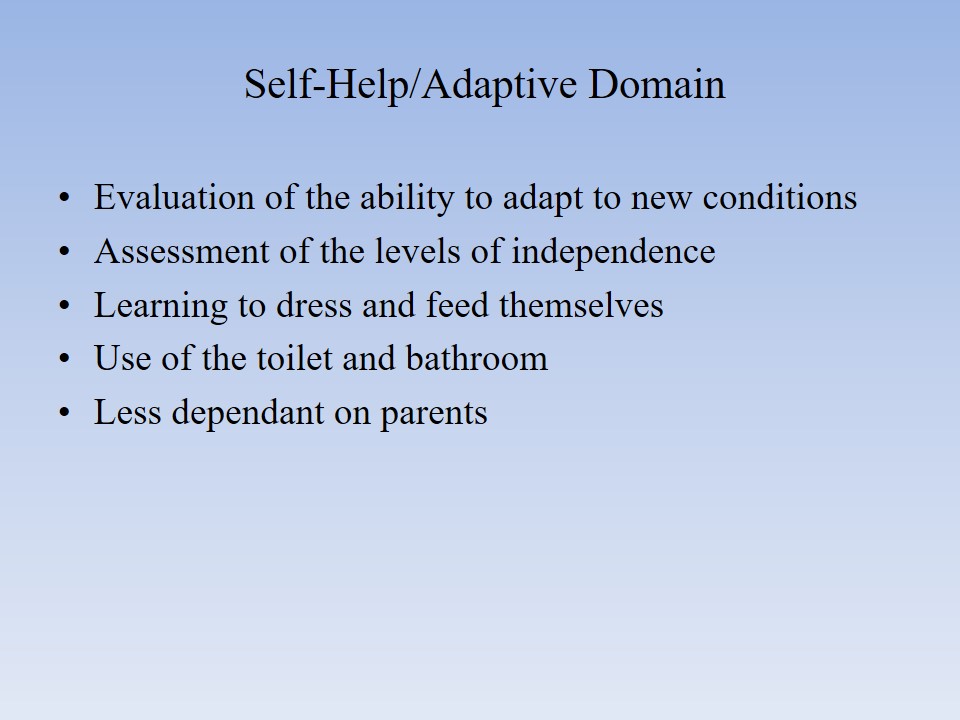
Tools to Assess Domains
- Need for the improved assessment methods.
- Introduction of the unified approach.
- Diversity of scales to evaluate developmental stages.
- Educators` need for the enhanced credibility of data.
- Different perspectives on children`s development.
Regarding the high importance of the above-mentioned models, there is a variety of methods and tools that are used to assess every domain and determine the state of the child`s development, his/her progress, make decisions about possible interventions, and select the most appropriate approaches to solve discovered problems and contribute to the overall improvement (Sims & Brettig, 2018). Thus, the selection of the tool should be preconditioned by several factors. Firs, its credibility, and efficiency should be proven (Bartolotta & Shulman, 2010). Second, it should be able to meet the existing requirements for the investigated aspects (Brebner, Jobanovic, Lawles, & Young, 2016). Finally, when an educator starts the evaluation of a young child`s development, he/she should be focused on who is involved, when and where it happens, and how it can be altered. For this reason, the selection of tools should help to meet these criteria.
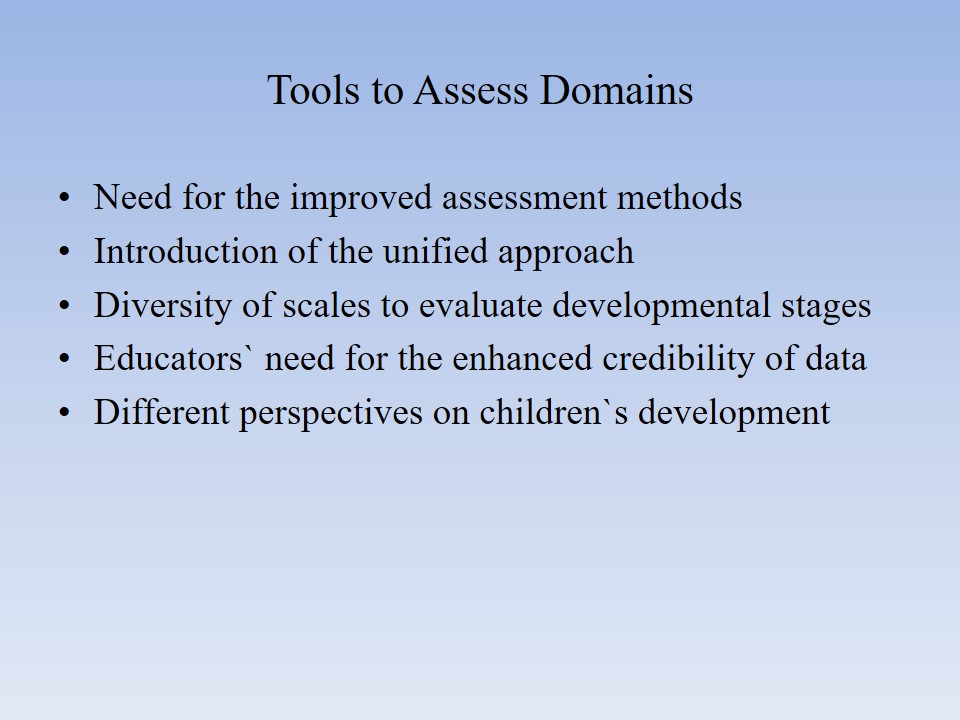
Monitoring of the Progress
- Standardized assessment.
- Utilization of the Learning Accomplishment Profile.
- Hawaii Early Learning Profile.
- Kaufman Instant and Preschool Scale.
- Non-standardized practices.
The outcomes of the assessment depend on the efficiency of data collection methods that provide information needed to monitor the progress and determine the stage of children`s development. There are several recommended approaches to accomplish this task. First of all, educators might use standardized assessment tools that rest on the generalized criteria peculiar to the majority of individuals (Brebner et al., 2016). It will provide them with the information needed for the comprehensive analysis. At the same time, the Learning Accomplishment Profile consisting of a series of screenings can be used to measure developmental skills in children and their progress (Sims & Brettig, 2018). Hawaii Early Learning Profile and Kaufman Instant and Preschool Scale also provide an opportunity to evaluate the state of a child, his/her cognitive, linguistic, motor, and emotional domains and progress in them (Sims & Brettig, 2018).
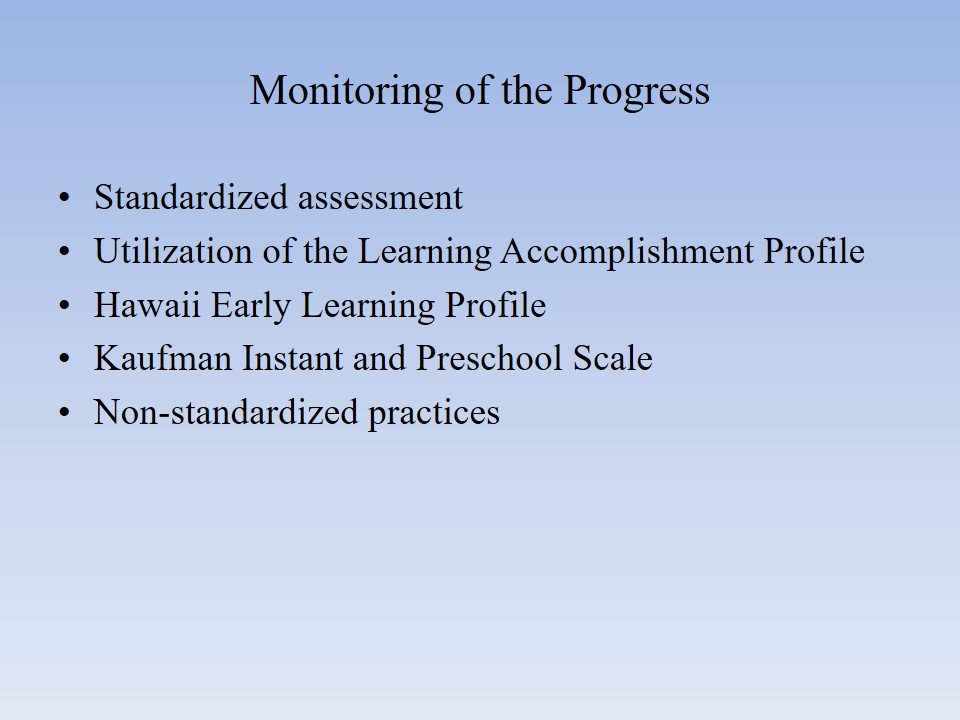
Inform Practice
- Utilization of data collected during monitoring stages.
- Critical assessment of existing needs.
- Multiple screening assessments.
- Use of standardized approaches.
- Increased need for the credibility of data.
Working with young children, educators should use credible and relevant data to inform practice and determine the existing demands and problems. For this reason, the method of screening remains one of the most potent tools that can be utilized under these conditions. It is a generalized type o assessment that is focused on the development of young children and analyses it by asking common questions to children and their parents about particular skills in different domains (Brebner et al., 2016). The practice helps to identify children who need more in-depth assessment and collect data to inform practice. At the same time, the educator can explore tools utilized for the monitoring of progress to gather information and use it to help children.
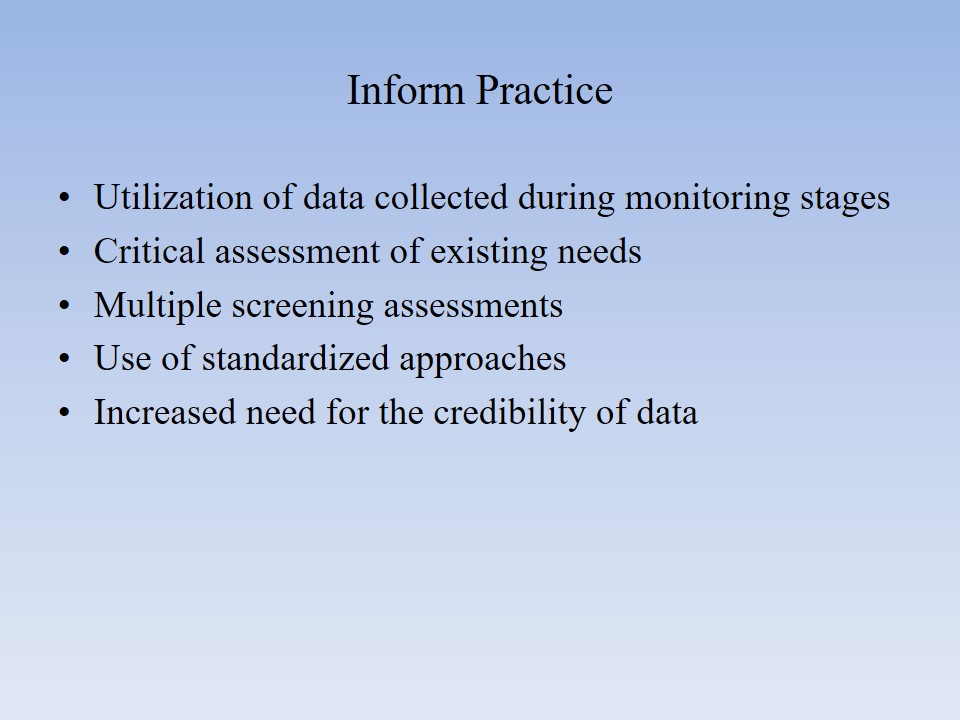
Decision-Making
- Need for relevant and credible data.
- Decision making becomes data-driven.
- Utilization of reports about previous assessments.
- Comparison of data at different periods of time.
- Grounded conclusion about the needed intervention.
The appropriate data-driven decision making related to the outlined domains to a greater degree depends on the quality of collected information, its credibility, and relevance. Additionally, the approaches to storing and analyzing data are critical (Moreno, Nagasawa, & Schwartz, 2018). That is why, observation, collection, and documenting of data related to all five domains should rest on specific written reports about the monthly assessment of children`s progress and their problematic issues (Brebner et al., 2016). It can be considered a key to the efficient decision-making and problem solving as it minimizes the probability of mistake and provides educators with multiple opportunities to compare data at different periods of time to make an appropriate decision and select the demanded intervention.
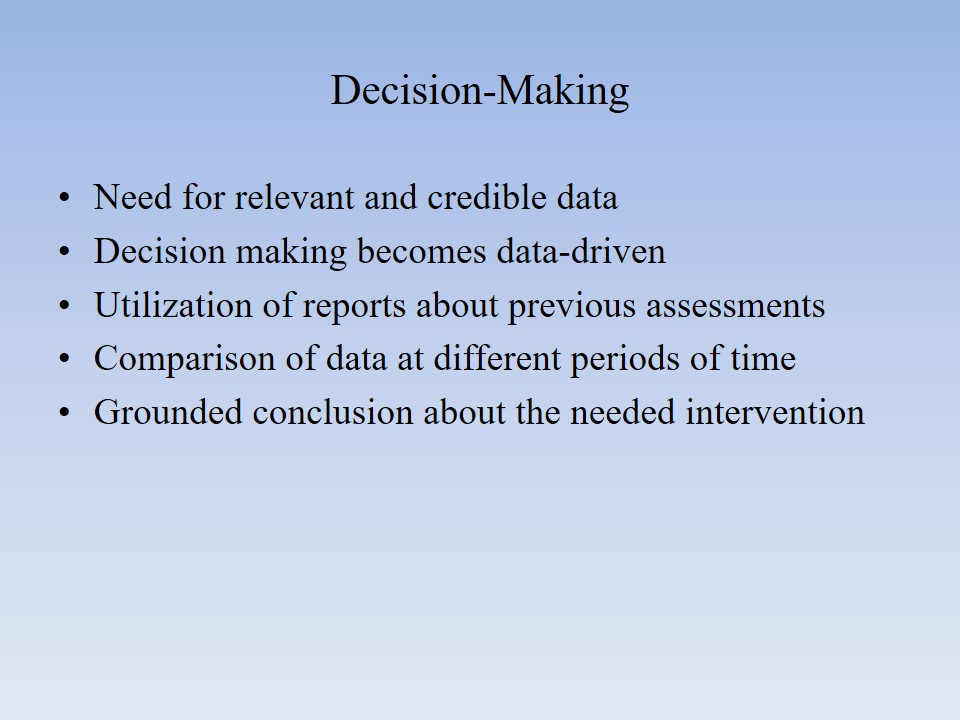
Promotion of Positive Outcomes
- Use of specific equipment for children with special needs.
- Introduction of efficient development practice.
- Utilization of collected data to create the efficient approach.
- Monitoring of change.
- Introduction of innovative technologies to facilitate learning.
To promote the positive outcomes, the educator should be ready to utilize the information he/she acquired during the observation and assessment to outline tools that can be used to improve problematic fields and attain the better result. At the same time, the existence of children with specific needs might also mean that an educator should use additional equipment such as applications for children with delays in cognitive behavior, games, or interactive practices to achieve success. (Brebner et al., 2016) At the same time, other digital devices can be utilized to attain success and ensure that all problems will be considered and solved.
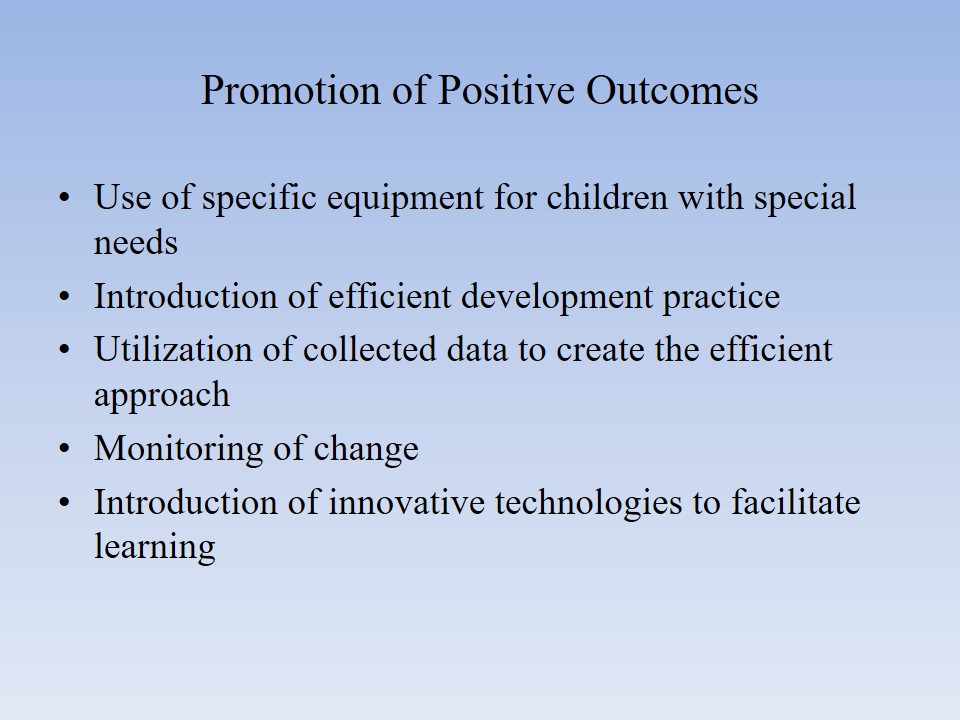
Practices to Build Learning Environment
- Beneficial learning environment contributes to better outcomes.
- Cooperation between specialists helps to attain a better efficiency of assessment tools.
- Continuity of assessment and provision of assistance can be established.
- Improved cooperation between specialists is central for the creation of the appropriate environment.
All young children will obviously benefit from the creation of the appropriate learning environment characterized by the existence of all factors and tools that might stimulate the development of domains and improved cognitive, motor, emotional, and other responses. The given setting can be established with the help of close cooperation between specialist responsible for the assessment and provision of the appropriate assistance (Brebner et al., 2016). For instance, children with problems in the cognitive domain should have work with psychologists who will determine their issues and create the plan of interventions to attain positive outcomes (Moreno et al., 2018). In such a way, the creation of the continuity of assessment and care is fundamental for the learning environment and final success.
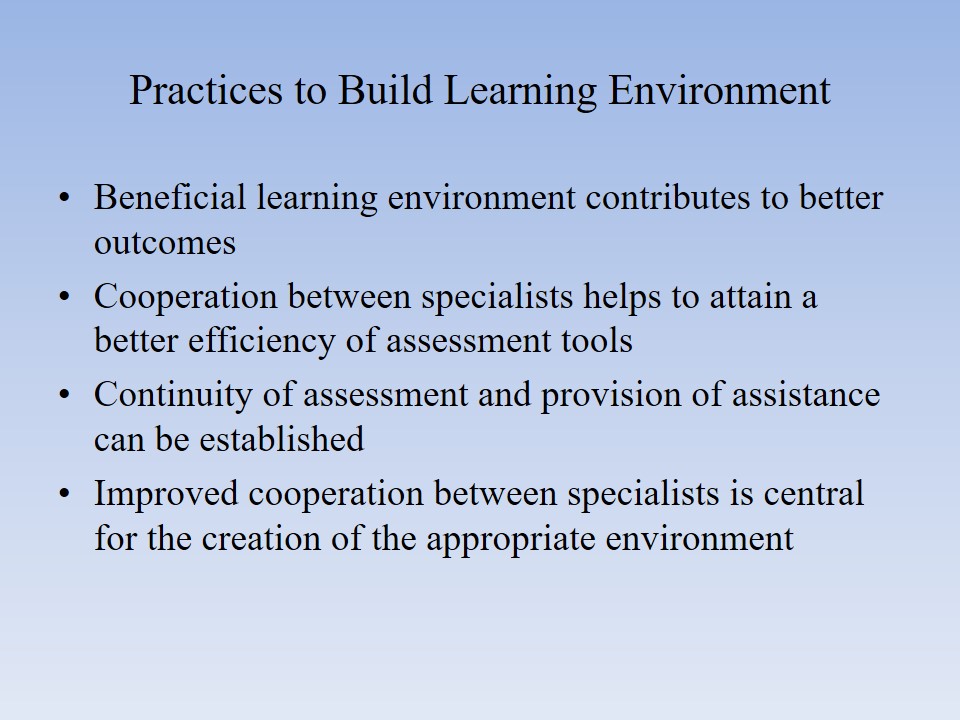
Parents` Engagement and Support
- Parents` participation guarantees better outcomes.
- Problems in children`s development have a negative impact on parents.
- Provision of the appropriate support and is critical.
- Families should be educated about how to assist children in their development.
- The given cooperation guarantees improved outcomes.
Finally, parents should be engaged in the process and become active actors who contribute to the development of their children. If the problematic situation emerges, they should be provided with additional training about how to assess a child`s state and create the environment beneficial for his/her development. (Brebner et al., 2016) Only under these conditions desired outcomes can be achieved.
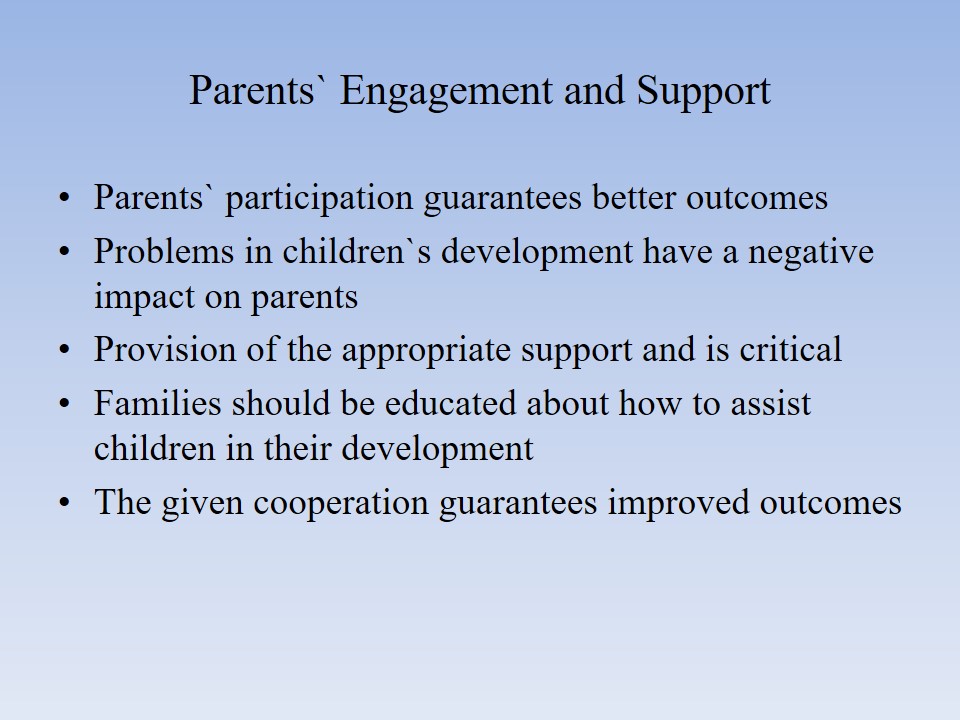
References
Bartolotta, T., & Shulman, B. (2010). Child development. In B. Shulman & N. Capone (Eds.), Language development (pp. 35-55). Mississauga, Canada: Jones and Bartlett Publishers.
Brebner, C., Jobanovic, J., Lawles, A., & Young, J. (2016). Early childhood educators’ understanding of early communication: Application to their work with young children. Child Language Teaching and Therapy , 32(3), 277-292. Web.
Department of Education. (2010). Catalog of screening and assessment instruments for young children birth through age 5. Web.
Moreno, A., Nagasawa, M., & Schwartz, T. (2018). Social and emotional learning and early childhood education: Redundant terms? Contemporary Issues in Early Childhood. Web.
Sims, M., & Brettig, K. (2018). Early childhood education and early childhood development: Do the differences matter? Power and Education. Web.